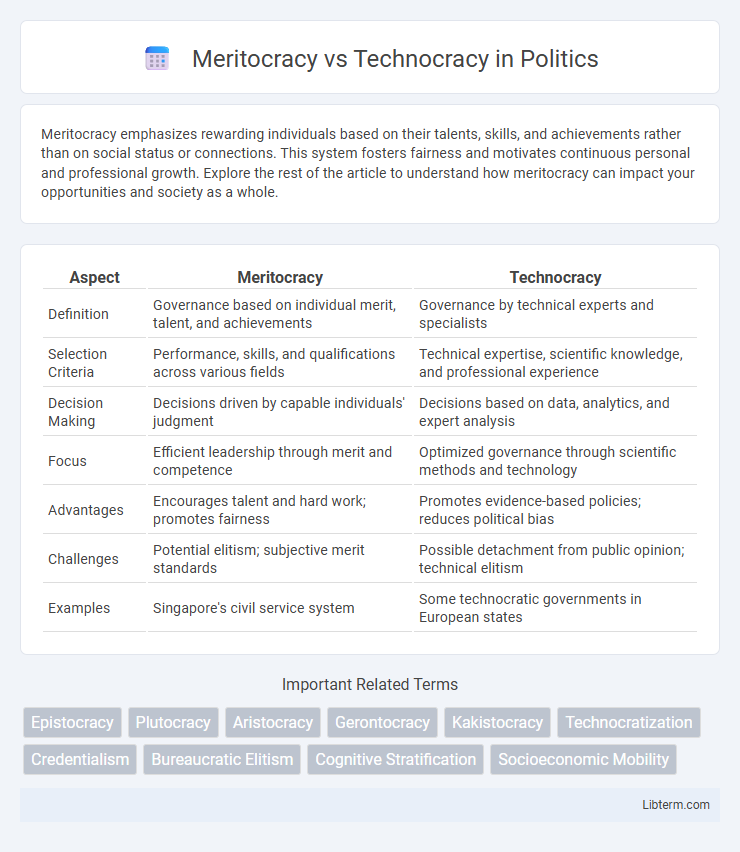Meritocracy emphasizes rewarding individuals based on their talents, skills, and achievements rather than on social status or connections. This system fosters fairness and motivates continuous personal and professional growth. Explore the rest of the article to understand how meritocracy can impact your opportunities and society as a whole.
Table of Comparison
| Aspect | Meritocracy | Technocracy |
|---|---|---|
| Definition | Governance based on individual merit, talent, and achievements | Governance by technical experts and specialists |
| Selection Criteria | Performance, skills, and qualifications across various fields | Technical expertise, scientific knowledge, and professional experience |
| Decision Making | Decisions driven by capable individuals' judgment | Decisions based on data, analytics, and expert analysis |
| Focus | Efficient leadership through merit and competence | Optimized governance through scientific methods and technology |
| Advantages | Encourages talent and hard work; promotes fairness | Promotes evidence-based policies; reduces political bias |
| Challenges | Potential elitism; subjective merit standards | Possible detachment from public opinion; technical elitism |
| Examples | Singapore's civil service system | Some technocratic governments in European states |
Understanding Meritocracy: Definition and Key Principles
Meritocracy is a system of governance or organizational management where individuals are selected and advanced based on their talents, skills, and achievements rather than on wealth, social class, or political connections. The key principles of meritocracy include equal opportunity, performance-based evaluation, and reward for competence, which aim to foster efficiency and innovation in leadership and decision-making. Emphasizing merit aims to create a fair environment where the most capable individuals, regardless of background, can influence policy and organizational success.
Defining Technocracy: Core Concepts and Origins
Technocracy is a system of governance where decision-makers are selected based on their technical expertise and specialized knowledge, often in fields like engineering, science, or economics. Originating in the early 20th century during the Progressive Era, technocracy emphasizes rational, data-driven policies and efficiency over political ideology or popular opinion. Core concepts include merit-based leadership, evidence-based decision-making, and the application of scientific methods to solve societal problems.
Historical Evolution of Meritocracy and Technocracy
Meritocracy originated in the early 20th century as a response to aristocratic rule, emphasizing individual talent and achievement as the basis for social advancement. Technocracy emerged during the same period, particularly in the 1930s, advocating for governance by technical experts and engineers to optimize economic and social systems. Both concepts evolved through industrialization and modernization, shaping contemporary debates on governance efficiency and social equity.
Fundamental Differences Between Meritocracy and Technocracy
Meritocracy emphasizes individual achievement and talent as the basis for leadership, promoting social mobility through merit-based rewards. Technocracy prioritizes expertise and technical knowledge, assigning decision-making power to specialists and scientists to optimize governance. The fundamental difference lies in meritocracy valuing personal capability broadly, while technocracy centers on specialized technical competence for societal management.
Key Benefits of a Meritocratic System
A meritocratic system promotes fairness by rewarding individuals based on talent, skills, and performance, ensuring that the most capable people occupy key positions. This approach enhances productivity, innovation, and organizational efficiency as decisions and leadership stem from demonstrated competence. By fostering motivation and continual self-improvement, meritocracy drives sustainable growth and competitive advantage across various sectors.
Advantages of Technocratic Governance
Technocratic governance promotes decision-making based on expertise and specialized knowledge, leading to more efficient and effective policy implementation. This system minimizes political bias and focuses on data-driven solutions, which can enhance economic development and technological innovation. Experts in technocracy prioritize long-term planning and evidence-based strategies, improving governance stability and societal progress.
Common Criticisms of Meritocracy
Meritocracy often faces criticism for perpetuating social inequality by favoring individuals with access to better education and resources, thus reinforcing existing privilege rather than truly rewarding merit. Critics argue that it overlooks structural barriers faced by marginalized groups, resulting in a system that may appear fair but inherently benefits the already advantaged. This selective opportunity narrows diversity and innovation, potentially stifling social mobility and inclusive progress.
Major Drawbacks of Technocracy
Technocracy often leads to a concentration of power in the hands of technical experts, which can undermine democratic decision-making and public accountability. The complexity of technical language and expertise may alienate ordinary citizens, creating a disconnect between policymakers and the general population. Furthermore, an overemphasis on technical efficiency can neglect social, ethical, and cultural considerations essential for holistic governance.
Real-World Examples: Meritocracy vs Technocracy in Practice
Singapore exemplifies meritocracy through its rigorous civil service exams and performance-based promotions, ensuring leadership based on individual achievement. Germany showcases technocracy by relying heavily on experts and engineers in policymaking, particularly in economic and environmental sectors, where technical expertise shapes decisions. Both systems prioritize competence, but meritocracy emphasizes personal merit across diverse fields, while technocracy centers on specialized knowledge and technical skills.
Future Prospects: Balancing Merit and Technical Expertise in Governance
Future governance models increasingly emphasize integrating meritocracy and technocracy to optimize decision-making processes. Balancing merit-based leadership selection with technical expertise ensures policies are both competently designed and broadly legitimate. Emerging trends in smart governance and AI-driven analytics highlight the critical role of combining human merit with specialized knowledge for sustainable development.
Meritocracy Infographic

 libterm.com
libterm.com